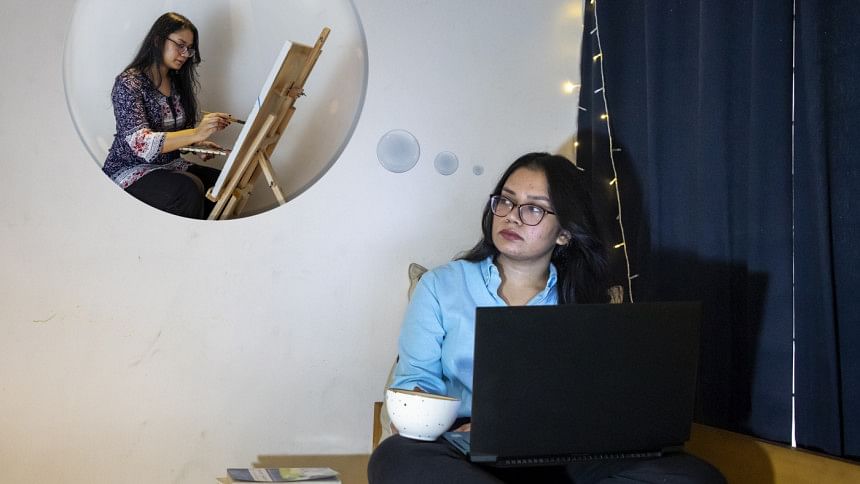Being stuck with the wrong major

During university entrance exam in Bangladesh, the primary target for most aspirants is to get into a public university. The pursuit involves getting into a particular university rather than going after a major they're interested in. In many cases, students aren't accustomed to the idea of evaluating the course content before choosing the major and end up making the choice based on trends, the job market, or simply what their parents tell them to do.
However, in this day and age where information is accessible at the press of a few keys, it might be confusing as to why choosing a university major is such a difficult task for most students. After all, resources have never been more accessible. But once we examine the sheer complexity and number of factors that influence this decision, it becomes all too clear.

Many young people feel that they're still not ready to make a decision that's going to decide so much about the rest of their lives.
"It is a bit unreasonable to expect seventeen-year-olds to decide upon a college degree that takes four years and a career that lasts forty," says Sarika Saiyara, an A2 level student at Academia School.
A majority of people at this young age don't get the chance to develop a passion for any field in particular. This can be attributed to a lack of exposure to what these fields actually demand. No student has the time to shadow a doctor, an engineer, and a lawyer as potential career options while also leading the pressure filled life of a high schooler.
"My options have already been narrowed down to engineering since I have a limited tolerance for Biology," says Ahnaf Hassan Kazi, an A2 student at SFX Greenherald School, who intends to pursue a career in STEM. "I have to choose between different kinds of engineering, but none have caught my attention as I'd hoped. They all sound either too computer-oriented or too mechanical, and I worry I won't be able to display passion in those fields."

Even the process of narrowing down can be difficult for people who go online looking for information. The avalanche of figures and statistics related to median income, job satisfaction percentage, automation risk, and so on can be beyond intimidating.
"The ongoing economic crisis, with declining employment rates and relative usable incomes, only adds to my concerns," Ahnaf continued.
However, once a decision is made and the humdrum of classes start, it's difficult for someone to accept the reality that the major chosen might not be suitable for that person.
Benzadid M Gani, an architecture student of Bangladesh University of Engineering Technology (BUET), says, "Since day one, I thought I had been misled into thinking that architecture was a subject best suited for those with a talent for drawing. This is most definitely not the case because architecture calls for an understanding of how people would perceive space even if they weren't living in it."

"Considering how almost everyone was handling the pressure better than me and I was failing to even understand many of the basic concepts, let alone apply them in projects, I realised I was in the wrong place," said Farhan Tahmid Ryan, a CSE undergraduate student at BUET. "Even classmates who didn't seem that serious in the first few semesters handled these difficulties much better than I did. Those who were on par with me have developed so many skills and have gone so far ahead that I can't catch up with them now. In the group projects, I was mostly a burden on my partners and in lab viva, I couldn't even understand the questions, let alone answer them."
With time, it becomes more and more exhausting to find motivation in oneself to push through the undergraduate years.
"The past few academic years have been extremely hectic and put a massive dent in my mental health," continued Benzadid, "I disliked staying up all night to work on my projects, and the constant thought that my work will be rejected by my teachers, which is very common, stressed me out. I became detached from my friends and developed chronic depression, often throwing tantrums at home with my parents out of anxiety and stress. My CGPA took a massive toll as well."
Although it might seem like a problem exclusive to people who are uncertain about their passions, even people who know what field they're enthusiastic about have a hard time deciding to major in it. There's the common trend of Arts and Humanities enthusiasts being torn between their own desires and the desires of their parents for them to go into a more traditionally respectable field. However, what might be surprising is that even conventionally popular fields of study aren't immune to these problems.
Puja Chakraborty, a university fresher, expresses her concerns about a career in academia despite being passionate about it, "Research is very hard, and the payoff is not great compared to other fields. I would not want to work too hard and get paid little as well, I will have bills to pay."
"With a dream to study something related to finance and money, I decided to shift from science after admission and pursue a career in finance-related fields," said Shaika Zaman Jeba, a student of Economics at Dhaka University, "I had to choose Economics because people said it's a flexible subject with broad aspects and a career related to finance would be possible. But economics is more than just the study of money. It requires a genuine interest and dedication to the subject outside the book and an understanding of the true essence of what it all means. I realised I chose the wrong major and just studying won't cut me slack here. I couldn't speak of research papers and development schemes. All I knew were a bunch of equations and graphs but nothing from the practical world."
Upon realisation, students often have no other option but to push through until graduation because dropping out is often not a feasible option in a Bangladeshi context. Changing majors is not an option in public universities, and is quite a hassle for private university students too. However, many end up changing tracks after graduation or working on a backup career option from student life.
"I intend on changing my core in Masters," continued Zeba, "I'm fortunate that a transition from Economics to Finance is feasible. I might even get an MBA and try for public service jobs. But after my undergraduate years, I'm certain that I won't opt for research organisations or academia in any way."
"I tried my best to migrate to a different university abroad with a subject of my forte, even as far as trying out as a fresher over there when I was already in my third year at my current university," said Benzadid, "However, the plans didn't proceed as I lacked the necessary funds to study there, despite getting scholarships. So, I stayed back and currently fighting for a decent CGPA that would enable me a good scholarship for masters and post-graduation, preferably in a different subject if I'm allowed."
On the bright side, many students succeed in finding interest in the majors they end up in. "I had trouble adapting to the subject initially and I didn't take my studies seriously in the first year," said Rezwana Saima, a student of Political Science at Dhaka University, "However, as I explored the subject, I realised they were relevant to the past and current world events. Although some of the topics are a bit abstract and boring, there are interesting courses each semester to look forward to and things I find genuine interest in. Now that I'm certain about what I want to pursue, I'm really looking forward to getting a Master's degree in this subject."
Being stuck with the wrong major is an unfortunately common experience for many students. While it's a disheartening situation for one to find themselves in, there are always many options open for young students. The trick is to evaluate one's own interests and future prospects with as much objectivity as possible, and keeping a positive mindset even if things don't seem to work out at first.
Aranyo Rishi Chowdhury is a student of SFX Greenherald School.
Hasib Ur Rashid Ifti is a student at Bangladesh University of Engineering Technology.

 For all latest news, follow The Daily Star's Google News channel.
For all latest news, follow The Daily Star's Google News channel. 








Comments